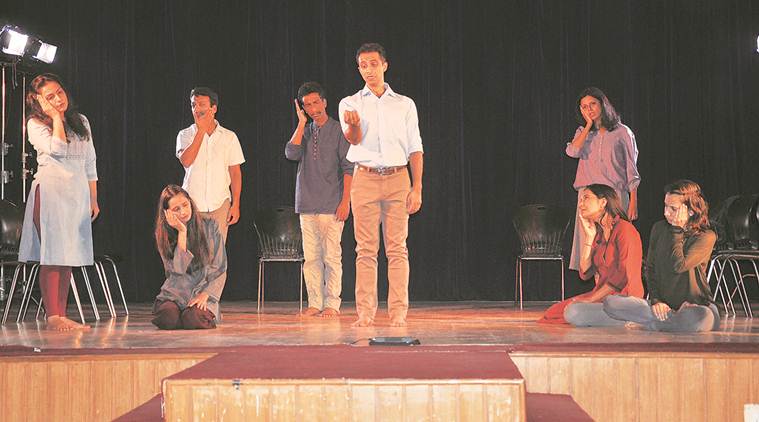Poetry in Motion
With intense study and research involved in reading and selecting the poetry, the idea was to push the boundaries of form and music, with both young and experienced actors bringing their own vision to the idea.

The production Blank Page
TAMAASHA Theatre attempts to be a playground of a multitude of movements, the larger vision being to widen the definition of theatre and not just spotlight a performance. So apart from an inter-disciplinary approach to the art form, where music, poetry, dance, study, and research come together on stage, with their distinct identities to create a new approach, the group is exploring small intimate and found spaces for performances, making theatre accessible to audiences. Founded in 2015 by well-known theatre director Sunil Shanbag and poet, actor and director Sapan Saran, Tamaasha travelled to Chandigarh with Blank Page, an interpretation of contemporary Indian poetry through theatre, music and movement.
A group of multi-talented performers interpret poetry written in English, Hindi, Marathi and Kashmiri by some of India’s finest contemporary poets, bringing to the centre themes of dissent, conflicting relationships, identity and the art of writing poetry itself. Conceptualised by Saran, who also performed in Blank Page, the performance piece is not a traditional play, she says. With intense study and research involved in reading and selecting the poetry, the idea was to push the boundaries of form and music, with both young and experienced actors bringing their own vision to the idea. “We had excellent poetry to choose from and certain themes resonated with us. How to weave these into a seamless narrative that had a structure was a challenge. That’s where drama, music, movement kicked in. Blank Page reached out to varied audiences with its powerful words and expression,” says Saran, who has written Club Desire and Classics Redux, and has directed several productions. She is currently working on a children’s play.
The larger promise of forming Tamaasha was to run several programmes and create an interaction between audiences and performers in informal found spaces, with the group using gyms, libraries, galleries, bars, empty lounges to perform, with collaborative efforts across the country. It also runs several programmes, from poetry reading to classical music appreciation and theatre modules at shelter homes for children with cancer.
The group has recently performed readings of German contemporary plays, which Saran says is a platform for young directors and actors to look at texts to create new productions. Urdu Hai Jiska Naam, which the group began in 2017, is an attempt to enter the rich world of Urdu literature, with readings from Urdu texts. Starting with the journey of a modern Urdu short story and then exploring other forms of writing like letters, poetry, and articles, Tamaasha has looked at writers from the progressive movement and also explored the work of contemporary writers who are keeping Urdu writing alive in India and Pakistan. “The idea is to present a different work and push the limits with new ideas and vocabulary,” says Saran.






















 Poet, actor and theatre director Sapan Saran;
Poet, actor and theatre director Sapan Saran;
No hay comentarios:
Publicar un comentario